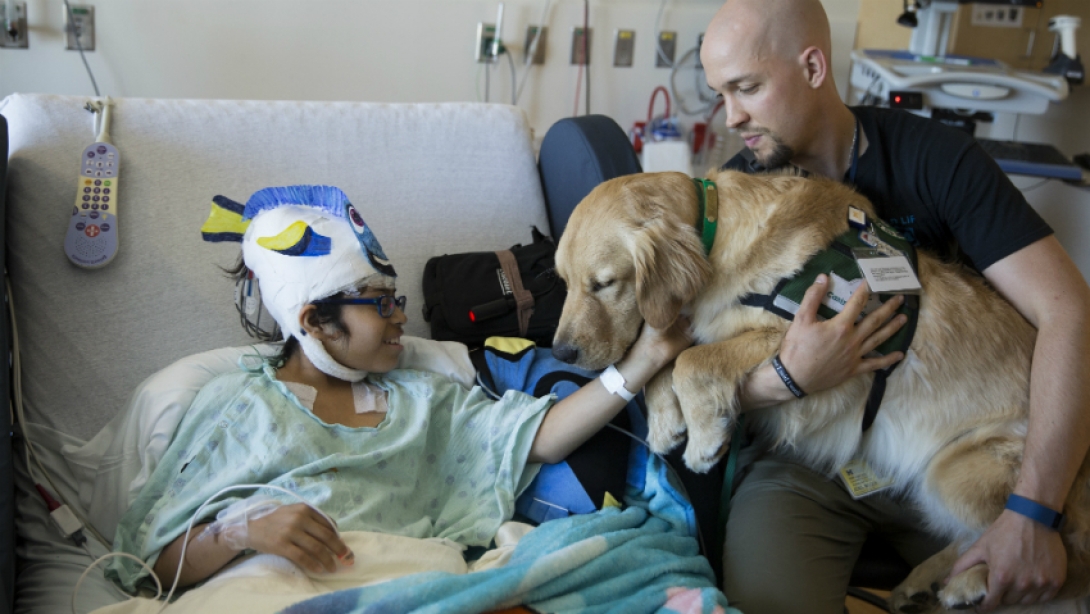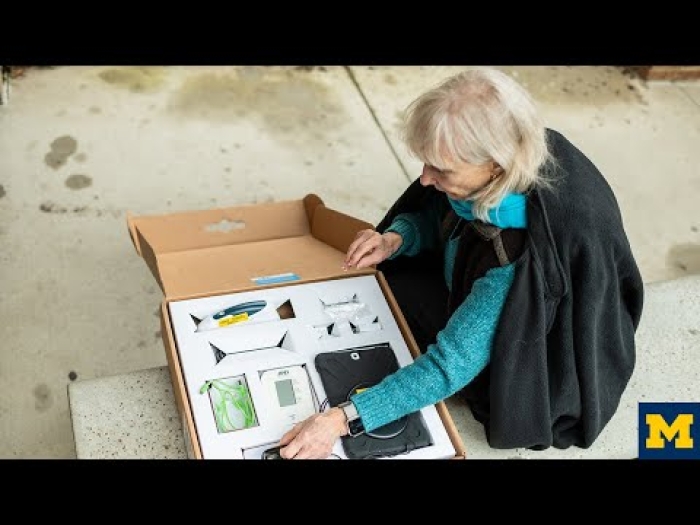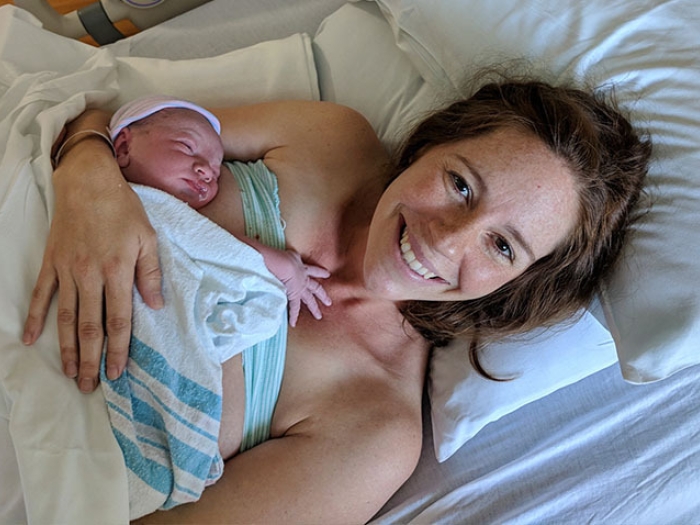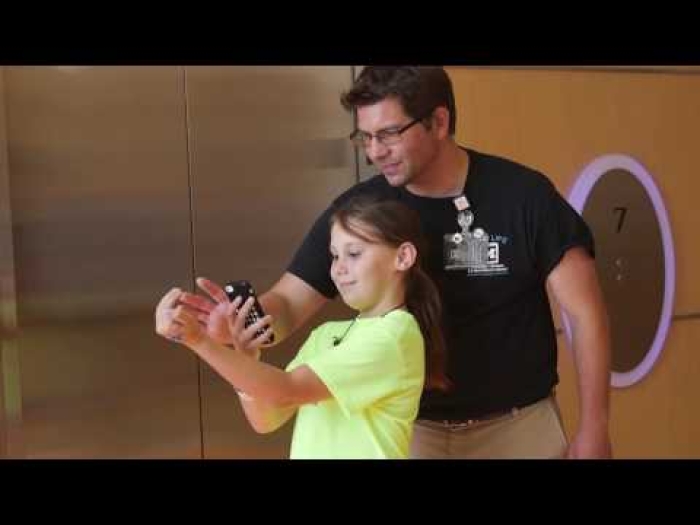Two new full-time hospital dogs at U-M are calming nervous patients and bringing smiles to visitors and staff.
7:00 AM
Author |
Anxious about having a catheter removed after surgery, the boy resisted the uncomfortable procedure.
"I need Denver," he said, fighting back tears.
SEE ALSO: Pokémon Go Makes Children's Hospital 'More of a Magical Place'
As soon as the Labrador-golden retriever mix, a new service dog at University of Michigan C.S. Mott Children's Hospital, entered the room, the patient calmed. The sight of a friendly animal defused the tension and allowed a nurse to work without incident.
In recent days, another youngster sought similar pacification: An offer to walk the 70-pound pup compelled him to get up from his hospital bed for a physical therapy session — a routine task that was typically slow, if not a struggle.
Denver, a graduate of the Canine Assistants training program in suburban Atlanta, delivers.
And the results can be instant.
"It's been extremely cool to see how he brings out the best in patients," says Joel Maier, a certified child life specialist at Mott who also serves as the dog's full-time caretaker. "I would have to build a rapport for two weeks to do what he does in seconds."
Although Denver is a service animal and has a job to do, his routine is far more interactive compared with that of a seeing-eye or police dog. Hospital employees and visitors can't help but stop to greet their furry friend during his 9-to-5 weekday shifts.
That, after all, is the intent.
Says a patch affixed to the green vest that Denver wears on duty: "Ask to pet me. I'm friendly."
They take in everyone's anxiety and emotions and really seem to calm people.The Rev. Lindsay Bona
Ready to serve
Denver isn't the only full-time four-legged addition to the University of Michigan Health System staff.
Anna, a golden retriever, is now making the rounds in Mott with the Rev. Lindsay Bona, manager of the Spiritual Care Department at the University of Michigan Health System.
Both animals came to Ann Arbor in late July. Raised with the purpose of service work since their births, each dog completed more than a year's worth of training via Canine Assistants before Bona and Maier traveled to Georgia this summer for a weeklong orientation and training.
Beyond exposing them to the environs of shopping malls, elevators and restaurants, the dogs were also trained in hospital settings to acclimate the canines to the unique sounds and smells of such facilities — as well as face time with humans battling illness.
Although conditioned to do so, neither dog performs support tasks such as summoning help or flipping a light switch. They respond, Maier says, to question-style dialogue and positive reinforcement versus a list of stern commands.
"The dogs can participate in therapy sessions right alongside our patients," Bona says.
Perhaps just as important, each bears the innate sense to nuzzle, lend a paw or simply rest at a bedside when a person needs it most.
"They take in all of everyone's anxiety and emotions and really seem to calm people," says Bona, a chaplain who notes that her job often finds her visiting folks in painful circumstances.
With Anna in tow, "it's amazing to watch the fear or whatever's going on just melt away."

A worthy investment
Working a full-time schedule, the dogs complement an existing canine therapy program at UMHS. Since 1987, volunteers and their canines from a group known as Therapaws of Michigan, Inc., have visited various parts of the Health System during scheduled visits. (Today, it is comprised of 28 volunteer dog-owner teams.)
SEE ALSO: Four Miraculous Kids, One First-Grade Classroom
While the decision to expand the animal therapy program to include full-time hospital dogs was easy — discussions began about a year ago — obtaining the new animals wasn't cheap.
Each cost nearly $30,000 to train, adopt and transport to Michigan.
The purchases were made possible by a donation from the Laurence Polatsch Memorial Fund, established in namesake honor of the 1990 U-M graduate who died in the terrorist attacks of Sept. 11, 2001.
UMHS also is seeking public contributions toward the cause.
Starting today, a crowdsourced "puppy shower" fundraising campaign will commence to help pay for Denver's and Anna's continued needs — frequent grooming, food and veterinary care – and maybe to add another Canine Assistants dog to the roster in the future.
Bona praised the dogs as an asset to the hospital system, not only for triggering health benefits such as improved mood and blood pressure, but also for providing a bridge for extended-stay patients missing their own animal companions.
"It's one step closer to home," she says. "Nobody else gives you that unconditional love."
Each dog, likewise, offers a different personality.
Denver tends to be low-key ("He melts onto the floor to let you love on him," Maier says), while Anna, according to Bona, "goes right up to people."
In either case, the newcomers already are thriving in a place where their presence is in high demand.
Says Maier: "People truly realize the power of pets."

Explore a variety of healthcare news & stories by visiting the Health Lab home page for more articles.

Department of Communication at Michigan Medicine
Want top health & research news weekly? Sign up for Health Lab’s newsletters today!





